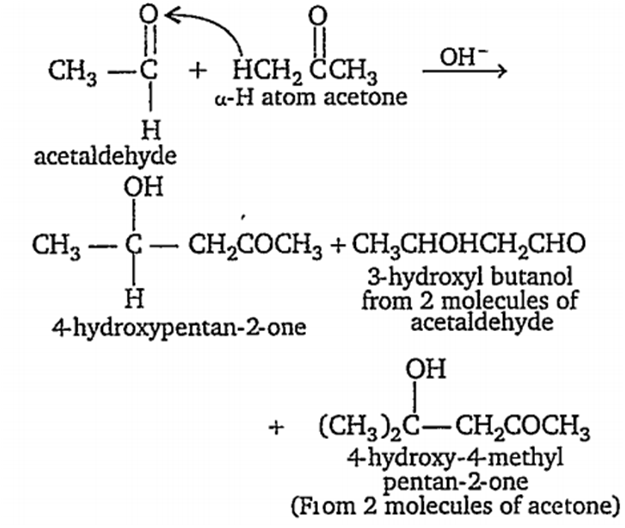 Multiple Choice Questions
Multiple Choice QuestionsSour taste of lemon is due to the presence of:
citric acid
acetic acid
oxalic acid
None of these
A compound (X) on ozonolysis followed by reduction gives an aldehyde C2H4O and 2-butanone, compound (X) is
3-methyl pentene-2
3-methyl pentene-3
3-methyl hexene-3
3-ethyl pentene-3
Cross aldol condensation occurs between
two same aldehydes
two same ketones
two different aldehydes and ketones
None of the above
C.
two different aldehydes and ketones
Aldol condensation is given by those aldehydes and ketones which have at least one α- H atom. When this reaction takes place between two different aldehydes and ketones, it is called cross aldol condensation, eg

Due to formation of a mixture of products, the reaction is not very useful in laboratories.
Cannizaro reaction is performed by
formaldehyde
Formaldehyde and acetaldehyde
benzaldehyde
formaldehyde and benzaldehyde
Which of the following, is an example of aldol condensation?
2CH3COCH3 CH3COHCH3CH2COCH3
2HCHO CH3OH
C6H5CHO + HCHO C6H5CH2OH
None of the above
Main product obtained from the reaction of ammonia and formaldehyde is
formic acid
methylamine
methanol
urotropine
The property which distinguishes formic acid from acetic acid is
only ammonium salt of formic acid on heating gives amide
when heated with alcohol/ H2SO4 only acetic acid forms ester
only acetic acid forms salts with alkali
only formic acid reduces Fehling's solution
